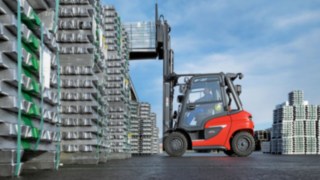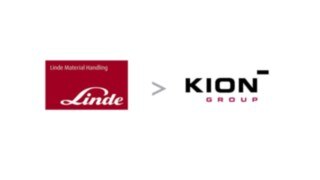
Alternative diesel fuel facilitates substantial reduction in greenhouse gas emissions
27 Sept 2022
Linde Material Handling approves biofuel for IC trucks
Fleet operators utilizing diesel forklifts from Linde Material Handling (MH) can now reduce their CO2 emissions by up to 90 percent through the use of hydrotreated vegetable oil (HVO). This fossil-free fuel has the additional benefits of providing extra power to the engine and giving cleaner combustion, while not requiring any adaptations to the refueling infrastructure and offering the option of being blended with regular diesel.
HVO diesel is made from one hundred percent renewable raw materials and does not release any new carbon dioxide into the atmosphere. It is produced by hydrotreating from various vegetable oils, animal fats, and waste and residual materials, such as used cooking oils and fats from restaurants and the food industry. Its chemical structure is almost identical to that of conventional diesel and can therefore replace it completely. “By approving this fuel for our diesel forklift engines, we are giving our customers the chance to massively reduce the carbon footprint of their diesel forklifts without having to invest a single cent in additional infrastructure,” says Frank Bergmann, Senior Product Manager Counterbalanced Forklifts. The cost per liter of HVO diesel, the expert adds, is slightly higher than that of standard diesel. But this is more than offset by the improved sustainability factor.
HVO boasts numerous advantages
In addition to reducing CO2 emissions by up to 90 percent compared to conventional diesel, local emissions such as particulate matter, nitrogen oxide (NOX), hydrocarbons (HC) and carbon monoxide (CO) are also reduced, which has a positive impact on the working environment of employees. In addition, HVO diesel has a higher propensity to ignite (cetane number), which results in efficient and clean combustion and reduces soot formation in engines and exhaust systems. The fuel’s high performance even at temperatures as low as -22 degrees° Celsius opens up a wide range of application options. Last but not least, the ability to flexibly blend HVO is a convincing argument: The fuel can be used in its pure form or in any mixing ratio with fossil diesel and requires no hardware adjustments to the IC truck.

Through the use of hydrotreated vegetable oil (HVO) fleet operators utilizing Linde diesel forklifts can now reduce their CO2 emissions by up to 90 percent.

Through the use of hydrotreated vegetable oil (HVO) fleet operators utilizing Linde diesel forklifts can now reduce their CO2 emissions by up to 90 percent.
Linde MH has approved the biofuel for both its current industrial trucks and most predecessor series in the load capacity range from 1.4 to 18 tons. “All customers who are unable to switch to electric forklifts in the short term can now improve their carbon footprint by changing to HVO,” states Frank Bergmann.

